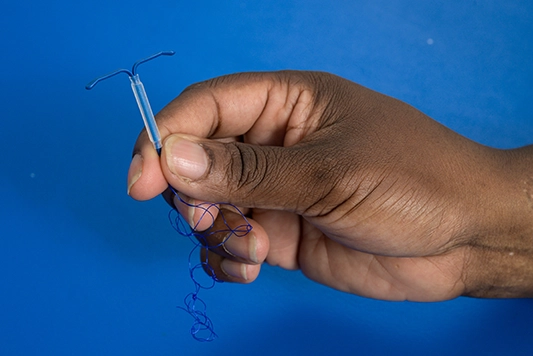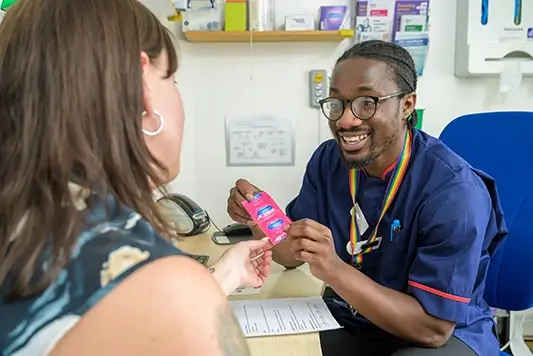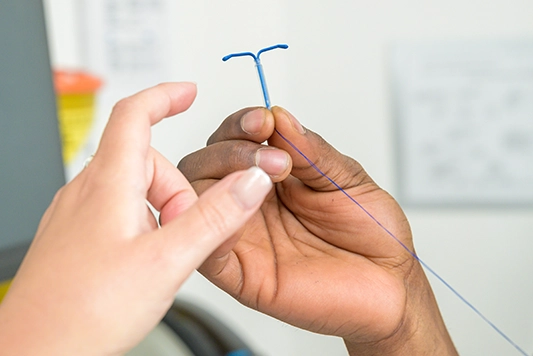There are two types of contraceptive pill: the combined pill, and the progestogen-only pill, sometimes called the mini-pill. The mini-pill is a daily pill that only contains one hormone: progestin. In this blog, we tell you all you need to know about the mini pill.
To find out more about the combined pill, read our blog: “The combined pill: what it is and how it works”
In this blog you will find information about:
- What the mini pill is
- How to use the mini pill
- Effectiveness of the mini pill
- Advantages of the mini pill
- Disadvantages of the mini pill
- How to avoid sexually transmitted diseases (STI’s)
- What to do if you miss a mini pill
What is the progestogen-only pill (mini pill)?
The progestogen*-only pill, also known as the “mini-pill”, is a daily tablet that contains one hormone. The hormone makes it harder for sperm to get into the uterus (womb) and may also change the lining of the uterus so an egg cannot develop in it. It sometimes prevents an egg from being released by the ovaries each month.
The progestogen-only pill needs to be taken at the same time each day.
*The terms “progestin” and “progestogen” are both used to refer to the mini pill: progestin is an artificial form of progestogen that is used for medical purposes.
How do I use the mini-pill?
In your first appointment with a doctor or clinician, you will discuss a range of contraceptive methods to find one that suits you. You can talk through your lifestyle, preferences, needs and medical history, and the clinician will assess the risks and benefits of contraceptive methods for the individual, considering all alternatives.
When taking your first pill, choose a convenient time to take it. This can be any time of the day. Once you’ve chosen a time you must then take one progestogen-only pill at this same time every day
After you finish all the pills in the pack start a new pack the next day so there are no breaks between packs.
Effectiveness of the mini-pill
The mini pill works well at preventing pregnancy. However, its ability to stop a pregnancy largely depends on a person using it properly. It is 99% effective. Around 1 in 100 people will get pregnant in a year when using the progestogen-only pill correctly. Remember, if you do not have a routine and think you will not be able to take a pill at the same time each day, the mini pill may not be the right method for you.
If you start to take the mini pill during the first five days of your period, you will be protected against pregnancy immediately. If you start to take the pill on any other day, you will not be protected against pregnancy until you’ve taken the pill for two days.
If you are accessing our abortion services (for a medical abortion or a surgical one), contraception counselling is part of your treatment should you wish to start a method of contraception following your abortion. We offer a range of LARC contraception methods, but if you haven’t quite made up your mind about contraception or we can’t give you what you want at the time – for example if you’ve had your abortion tablets posted to you – do consider having a temporary method to tide you over.
We call this a bridging method, to get you from now until you get the method of your choice without putting you at risk of an unwanted pregnancy. The mini pill is the perfect example of an effective bridging method due to how quickly it protects against pregnancy.
Advantages of the mini pill
As with all contraceptive methods, there are a range of advantages and disadvantages to taking the mini pill.
The mini pill and periods
One advantage of the mini pill is that your period may become lighter or stop altogether. If you prefer to have regular periods, this may not be the right method for you. It is also important to note that you may still get spotting between periods. This is normal when taking the mini pill.
Other advantages include:
- It can be used when you are breast feeding.
- Your fertility will return to normal immediately after you stop using the mini pill.
- You can start it straight after childbirth, abortion or miscarriage.
- It is not used during sex so will not affect spontaneity.
- It is useful if you cannot take the hormone oestrogen, which is in the combined pill, contraceptive patch and vaginal ring.
There are also less risks associated with the mini pill than with the combined contraceptive pill. To find out more about the risks associated with the combined pill, read our blog: “The contraceptive pill and blood clots: everything you need to know”
Disadvantages of the mini pill
One of the disadvantages of the mini pill is that the pill must be taken once per day, at the same time. Forgetting to take the pill daily could make it fail. It is important to consider whether you would be able to take the pill at the same time each day when choosing the right contraceptive method for you.
Other disadvantages and side effects of the mini pill include:
- Some users develop more frequent or irregular bleeding while taking the mini pill.
- It does not protect you against Sexually Transmitted Infections (STIs).
- Some users may experience headaches, breast tenderness and acne, but these symptoms generally get better within the first few months of using the pill.
- The pill may not work if you have vomiting and diarrhoea.
- Use of some medications, such as those for seizures (fits), HIV or for tuberculosis, can make the pill less effective. Check with your medical provider if your medications are compatible with use of the pill.
- It is possible that some users may experience weight gain as a side effect of the mini pill, although there is little causal evidence to suggest this.
How to avoid sexually transmitted infections (STIs)
Condoms are the only contraceptive method which protect against sexually transmitted infections. To ensure protection from both pregnancy and infection, we recommend “dual protection”. This means using a male or female condom in addition to the contraceptive method of your choice to prevent pregnancy.
What to do if you miss a mini pill
If you miss a pill, the course of action you should take depends on when you missed your pill, how many pills you have missed, and whether your mini pill contains desogestrel or not.
For information on what to do if you miss a combined pill, read the NHS website: What should I do if I miss a pill (combined pill)?
Taking the mini pill after an abortion
If you start the pill more than five days after an abortion, you will not be protected against pregnancy until you’ve taken the pill for two days.
“CHOICE”: MSI UK’s digital contraception counsellor
At MSI UK, we believe that information about contraception should be readily available. If you need help finding the best contraceptive method for you, try our digital contraception counsellor “Choice”. Using “Choice”, you can receive personalised contraceptive advice by answering a few short questions about your lifestyle, preferences, needs and medical history.
Useful links:
We would advise anyone worried about possible side effects from the contraceptive pill to seek advice from their GP before discontinuing. To learn more, click on the links below:
- “The combined pill: what it is and how it works”.
- For more information on the mini pill, you can visit the NHS website here: The Progestogen-only Pill: Your contraception guide







